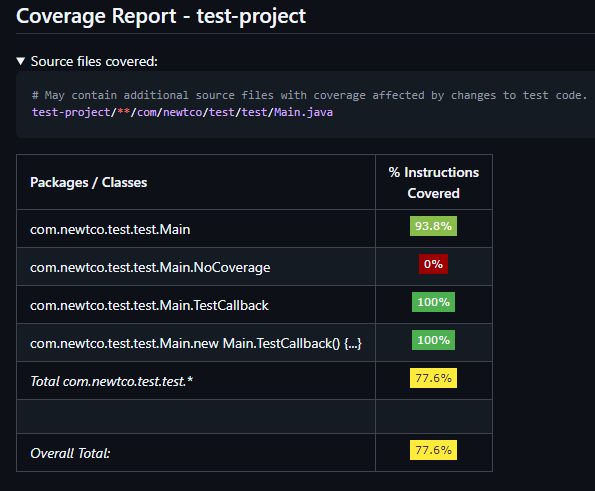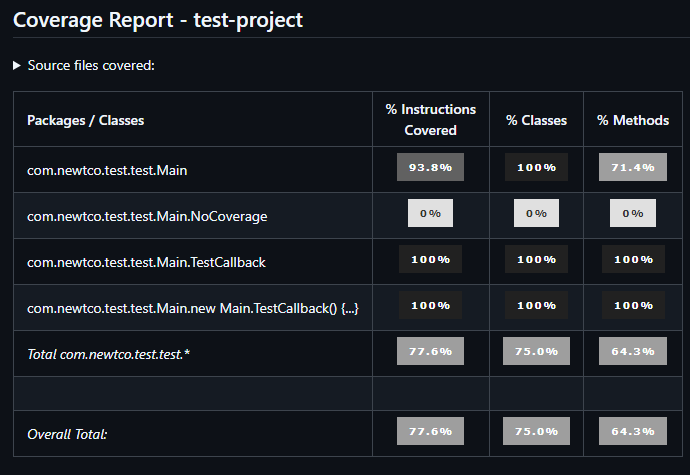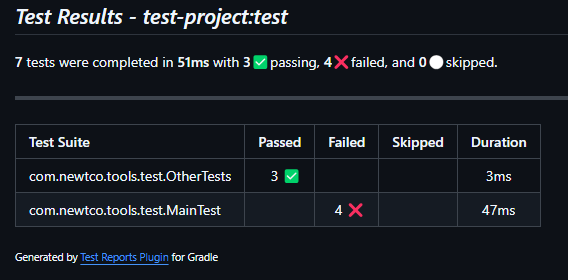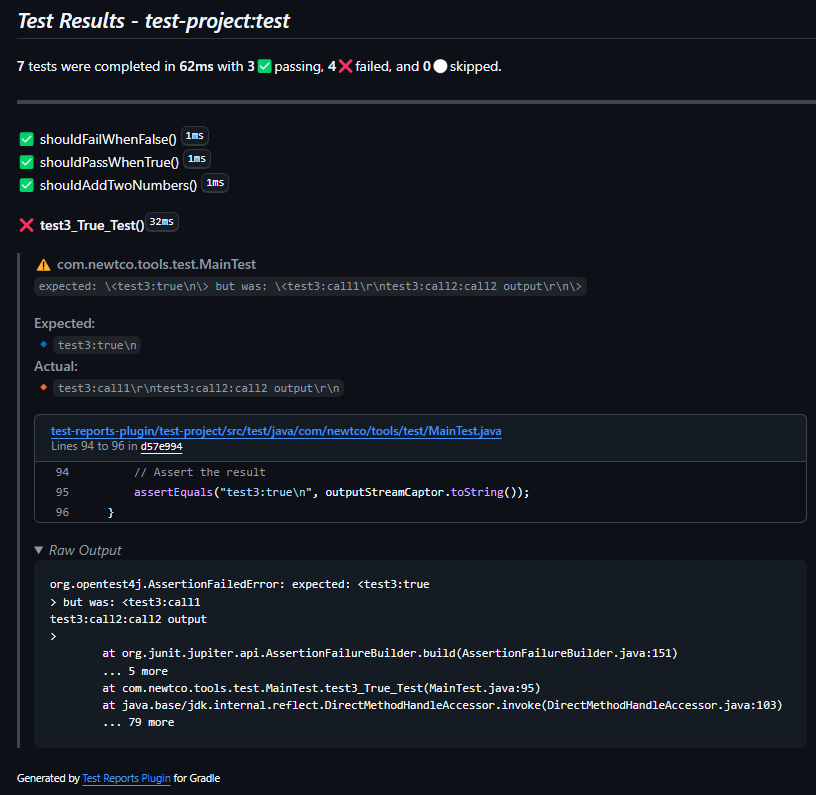A Gradle plugin to add JSON and Markdown reports to JaCoCo and JUnit test tasks.
{
"report": {
"name": "test-project",
"counters": {
"instruction": 77.59,
"branch": 100.0,
"line": 70.83,
"complexity": 66.67,
"class": 75.0,
"method": 64.29
},
"packages": [
{
"name": "org.newtco.test.test",
"counters": {
"instruction": 77.59,
"branch": 100.0,
"line": 70.83,
"complexity": 66.67,
"class": 75.0,
"method": 64.29
},
"classes": [
{
"name": "Main.TestCallback",
"sourceFile": "Main.java",
"counters": {
"instruction": 100.0,
"branch": 0,
"line": 100.0,
"complexity": 100.0,
"class": 100.0,
"method": 100.0
},
"methods": [
{
"name": "<init>",
"signature": "Main.TestCallback()",
"line": {
"first": 62,
"last": 62
},
"counters": {
"instruction": 100.0,
"branch": 0,
"line": 100.0,
"complexity": 100.0,
"class": 0,
"method": 100.0
}
}
]
},
{
"name": "Main",
"sourceFile": "Main.java",
"counters": {
"instruction": 93.75,
"branch": 100.0,
"line": 85.71,
"complexity": 75.0,
"class": 100.0,
"method": 71.43
},
"methods": [
{
"name": "<init>",
"signature": "Main()",
"line": {
"first": 19,
"last": 19
},
"counters": {
"instruction": 100.0,
"branch": 0,
"line": 100.0,
"complexity": 100.0,
"class": 0,
"method": 100.0
}
},
{
"name": "test1",
"signature": "test1()",
"line": {
"first": 22,
"last": 23
},
"counters": {
"instruction": 100.0,
"branch": 0,
"line": 100.0,
"complexity": 100.0,
"class": 0,
"method": 100.0
}
}
]
},
{
"name": "Main.new Main.TestCallback() {...}",
"sourceFile": "Main.java",
"counters": {
"instruction": 100.0,
"branch": 0,
"line": 100.0,
"complexity": 100.0,
"class": 100.0,
"method": 100.0
},
"methods": [
{
"name": "call1",
"signature": "call1()",
"line": {
"first": 35,
"last": 36
},
"counters": {
"instruction": 100.0,
"branch": 0,
"line": 100.0,
"complexity": 100.0,
"class": 0,
"method": 100.0
}
}
]
}
],
"sourceFiles": [
{
"name": "Main.java",
"counters": {
"instruction": 77.59,
"branch": 100.0,
"line": 70.83,
"complexity": 66.67,
"class": 75.0,
"method": 64.29
},
"lines": [
{
"number": 19,
"instructions": 100.0,
"branches": 0
},
{
"number": 22,
"instructions": 100.0,
"branches": 0
}
]
}
]
}
]
}
}{
"report": {
"name": "test-project",
"counters": {
"instruction": {
"covered": 45,
"missed": 13
},
"branch": {
"covered": 2,
"missed": 0
},
"line": {
"covered": 17,
"missed": 7
},
"complexity": {
"covered": 10,
"missed": 5
},
"class": {
"covered": 3,
"missed": 1
},
"method": {
"covered": 9,
"missed": 5
}
}
}
}To apply the plugin, add the following to your build.gradle file:
plugins {
id 'org.newtco.test.test-reports-plugin' version '1.0.0'
}Alternatively, if you are using the legacy plugin application method, you can use:
buildscript {
repositories {
gradlePluginPortal()
}
dependencies {
classpath 'org.newtco.test.test-reports-plugin:1.0.0'
}
}
apply plugin: 'org.newtco.test.test-reports-plugin'JSON reports are generated by the plugin directly in code and do not support any customization beyond the few properties documented below.
Markdown reports are based on simple templates which compile to Java code. The plugin will create a new SourceSet named
test-reports and copy the default templates for both coverage and tests output to subdirectories of the SourceSet.
You can modify these templates if required. The templates are shared by all test tasks.
A single task for transpiling the templates to Java classes is created. This task allows you to change the package name of generated templates.
Groovy DSL:
tasks.named("processReportTemplates").configure {
templatePackage = "org.newtco.test.report.templates"
}Kotlin DSL:
tasks.named("processReportTemplates").configure {
setProperty("templatePackage", "org.newtco.test.report.templates")
}Both JSON and Markdown reports are configured as extensions of the existing Test and JacocoReport tasks.
tasks.withType(Test).configureEach {
additionalReports {
// Stack filters allow you to include/exclude certain classes from the stack traces
// of test failure outputs in a report. This greatly reduces the size of stack traces
// in report outputs.
stackFilters {
include(
// Default is to include project classes
"${project.group}.**"
)
}
// Three properties control how reports attempt to generate GitHub/GitLab permalinks to the
// failing line of a test case.
//
// Owner/repository associated with the report output.
//
// Default Value: GITHUB_REPOSITORY or CI_PROJECT_PATH_SLUG environment variable.
gitLinkRepository = "newty-coffee/test-reports-plugin"
//
// Commit ID associated with the report.
//
// Default Value: GITHUB_SHA or CI_COMMIT_SHA environment variable
gitLinkCommit = System.getenv("GITHUB_SHA")
//
// URL template used for generating links to the source code files in the report.
// Supported template replacement parameters:
// repository - maps to gitLinkRepository property
// commit - maps to gitLinkCommit property
// file - maps to source code file path relative to the git repo root
//
// Default value: https://github.com/{repository}/blob/{commit}/{file} or
// https://gitlab.com/{repository}/blob/{commit}/{file}
gitLinkUrlTemplate = "https://github.com/{repository}/blob/{commit}/{file}"
// JSON configuration
json {
enabled = true
// Merge all JSON reports into a single .json file
aggregateReports = false
// Include the system err logs in the reports
includeSystemErrLog = true
// Include the system out logs in the reports
includeSystemOutLog = true
// Whether to associate err/out logs with test cases or test suites
outputPerTestCase = true
// Only capture specific test outcomes
testOutcomes("passed", "failed", "skipped")
}
// Summary markdown report configuration
summaryMarkdown {
enabled = true
// Merge all summary reports into a single .md file
aggregateReports = true
}
// Detailed markdown report configuration
detailedMarkdown {
enabled = true
// Merge all detailed reports into a single .md file
aggregateReports = false
// Same as for JSON configuration
includeSystemErrLog = true
includeSystemOutLog = true
outputPerTestCase = true
// Limit output to only failed and skipped tests
testOutcomes("failure", "skipped")
}
}
// Alternatively, configure the extension type
extensions.getByType(org.newtco.test.reports.plugin.test.TestReportsExtension).configure {
// Same as additionalReports above
}
}tasks.withType<Test> {
additionalReports {
// Same as Groovy DSL
}
// Alternatively, configure the extension type (without the use of getByType())
extensions.configure(org.newtco.test.reports.plugin.test.TestReportsExtension::class) {
// Same as Groovy DSL
}
}tasks.withType(JacocoReport).configureEach {
additionalReports {
// Sets the git ref name used as the base ref to generate a list of files changed. If
// the plugin is able to generate a list of files which have changed, it will limit
// report output to only those files. The plugin will also detect the dependencies of
// any test and add those as well. This allows capturing coverage changes when only
// tests are modified.
// The plugin will run the following command to generate the list:
// git --no-pager diff --name-only {gitBaseRef} HEAD -- {project.name}/**/*.java
//
// Default value: GITHUB_BASE_REF or CI_MERGE_REQUEST_TARGET_BRANCH_NAME environment
// variable
gitBaseRef = "develop"
// List of Java source files to include or exclude in the coverage report. The plugin
// will add files to this list if it can detect files changed via the gitBaseRef
// property.
changeSet {
// Exclude Test files
exclude "**/*Test.java"
}
// JSON configuration
json {
enabled = true
// Whether to include line coverage information in the report
includeLines = false
// Whether to include method coverage information in the report
includeMethods = false
// Whether to include class coverage information in the report
includeClasses = true
// Whether to include source coverage information in the report
includeSources = false
// Whether to simplify counters as a percentage or an object containing covered
// and missed properties
simplifiedCounters = true
}
// Summary markdown report configuration
summaryMarkdown {
enabled = true
// The shields.io badge style for coverage amounts in the report
badgeStyle = "flat-square"
// The color scheme used for coverage badges. 3 color schemes exist:
// - green-red, monochrome, blue-red
colorScheme = "green-red"
// Whether to abbreviate package names in the report
abbreviatePackages = true
}
// Detailed markdown report configuration. Same as summaryMarkdown configuration
detailedMarkdown {
enabled = true
badgeStyle = "flat-square"
abbreviatePackages = false
}
}
// Alternatively, configure the extension type
extensions.getByType(org.newtco.test.reports.plugin.coverage.CoverageReportsExtension)
.configure {
// Same as additionalReports above
}
}tasks.withType<JacocoReport> {
additionalReports {
// Same as Groovy DSL
}
// Alternatively, configure the extension type (without the use of getByType())
extensions.configure(org.newtco.test.reports.plugin.coverage.CoverageReportsExtension::class) {
// Same as Groovy DSL
}
}My template changes won't compile.
- Review the generated Java class under the build/generated/sources/reportTemplates directory. The template API is very basic and not documented. It basically supports 3 things:
importstatements,text output, andcode blocks.- If you're still stuck, delete the template from the
srcdirectory and the plugin will re-copy the default.
If you would like to contribute to the plugin, please follow the guidelines below:
- Fork the repository.
- Create a new branch (
git checkout -b feature/your-feature). - Make your changes and commit them (
git commit -am 'Add new feature'). - Push to the branch (
git push origin feature/your-feature). - Create a new Pull Request.
This project is licensed under the Apache License, Version 2.0 - see the LICENSE file for details.



